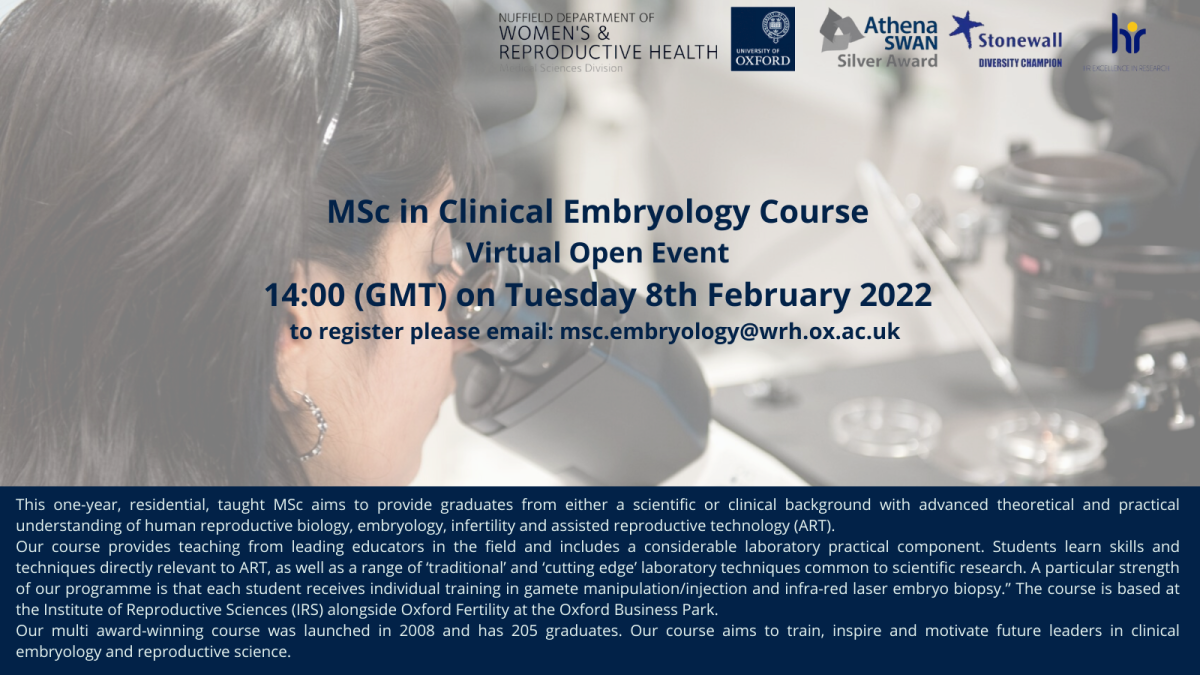
IVF NewsWebinar: 𝙇𝙚𝙖𝙧𝙣 𝙖𝙗𝙤𝙪𝙩 #𝙁𝙚𝙧𝙩𝙞𝙡𝙞𝙩𝙮 𝙋𝙧𝙚𝙨𝙚𝙧𝙫𝙖𝙩𝙞𝙤𝙣 & #𝘼𝙍𝙏
Dr. Prof (Col) Pankaj Talwar VSM 07 February 2022
Announcement: Global Survey-Clinical embryology practice patterns, challenges, career plans, and perspectives’
Lifeinvitro Academy 07 February 2022

You are invited to support a unique opportunity for clinical embryologists/IVF laboratory professionals. You are invited to share your opinions and perceptions about clinical embryology by taking the following survey. Through your participation, this survey will provide a portrait of embryologists' morale levels, practice patterns and perspectives across the globe. Please feel free to distribute the survey link to your peers and colleagues in social media and WhatsApp groups- https://www.surveymonkey.com/r/GK6LMLB The survey takes about 20 minutes to complete! Only complete responses will be included in the final analysis. "Don't miss the open ended questions on your personal views (what you think?) at the end of the survey" [ Full Article ] Webinar: Green IVF
International IVF Initiative 31 January 2022

Moderators: [ Full Article ] News: No evidence for using polygenic risk scores in embryo selection
Eleanor Gallegos 31 January 2022
The use of polygenic risk scores (PRSs) to select embryos is being advertised and sold by some private fertility clinics. Such clinics have claimed that PRSs for an embryo can help to predict the likelihood of the future child developing certain conditions or complex traits, when these are thought to be influenced by multiple different genes. However, a paper published in the European Journal of Human Genetics states that there is no evidence that PRSs can reliably anticipate an individual's characteristics in this way. The paper argues that the use of PRSs to select embryos is both unproven and unethical. 'Many conditions are caused by a combination of genetics and environment, and PRSs are only able to capture parts of any of the relevant genetic component, which is itself likely to be highly complex and difficult to analyse,' said Dr Francesca Forzano, first author of the paper and chair of the European Society of Human Genetics (ESHG)'s Public and Professional Policy Committee. 'In addition, while PRSs may identify individuals at risk of a given disease in the general population (where the genetic variability is very wide) there is no evidence that they can be useful for a couple in determining the choice of one embryo over another, as the genetic variability within an individual family is limited.' Individuals have different variants of particular genes. PRSs looks at variants, across multiple genes, which can influence the development of a disease or trait. Certain variants may increase the likelihood of developing a particular trait, while others may decrease the likelihood. A PRS for a particular trait in a particular individual takes what we currently know about genetic variants in a particular population of people, and then predicts where the individual is likely to fall in the distribution of the trait across the entire population. (For example, if the trait in question is height, the PRS might predict whether the individual is likely to be among the tallest 20 percent of the population, the shortest 20 percent of the population, or somewhere in the middle.) The UK's fertility regulator - the Human Fertilisation and Embryology Authority (HFEA) – told the Times: 'The use of PRSs in pre-implantation genetic testing is currently illegal in the UK. Embryo selection is only legal in the UK to avoid serious inherited illnesses.' Sarah Norcross, director of the charity Progress Educational Trust, which publishes BioNews, called for regulators to keep a careful eye on the marketing of these tests in the UK. 'It is neither scientifically nor ethically legitimate to try to select embryos using PRSs,' she said. 'Even if – for the sake of argument, and despite a complete lack of clinical evidence – a PRS could meaningfully predict certain things about certain embryos, the sheer number of embryos that would be needed to make use of this test could not be achieved in a clinical setting. There are precious few embryos to choose from in a fertility treatment context, and so reasons for preferring one embryo over another must be grounded in clear evidence.' SOURCES & REFERENCES
[ Full Article ] Webinar: SMALL OBJECTS OF DESIRE
International IVF Initiative 24 January 2022

Tuesday, 25th January, 2022. 3pm EST/ 8pm UK/ 9pm CET [ Full Article ] News: Light shed on de novo mutations behind male infertility
Georgia Stimpson 24 January 2022
Mutations in genes that are involved in sperm production have been highlighted as a potential cause of infertility in affected men. De novo mutations are genetic changes which occur either in the gametes of the parents or in early embryo development and therefore are not present in the parents of the affected individual. A genetic study of men with low sperm counts or no sperm has identified 29 such mutations which could be the cause of their fertility problems. Researchers at Newcastle University and Radboud University Medical Centre, the Netherlands, have said this could provide answers for some of the approximately 40 percent of infertile men with an unknown cause. 'This is a real paradigm shift in our understanding of the causes of male infertility. Most genetic studies look at recessively inherited causes of infertility, whereby both parents are a carrier of a mutation in a gene, and infertility occurs when the son receives both mutated copies, resulting in problems with their fertility.' said Professor Joris Veltman, one of the study's senior authors and Dean of Newcastle University's Biosciences Institute. 'At present, we don't understand the underlying cause in the majority of infertile men, and this research will hopefully increase the percentage of men for whom we can provide answers'. Researchers compared the exome data of 185 infertile men to the exome data from both their mother and father, using a technique called trio-based whole exome sequencing. The data revealed 192 rare de novo mutations, of which 145 had an effect on protein production. Of these, 29 had been linked to reproductive processes, such as sperm production, while for a further 50 it remains unclear if they are linked to reproduction. One gene of particular interest identified in this study was RDM5, which has previously been shown to cause severe infertility in mice. In a further analysis of existing data sets of a different cohort of men, six different mutations affecting this RDM5 gene were identified in seven of 2506 infertile men in the cohort, and none were found in the 5784 fertile men in the cohort. Most of the mutations identified in this study are thought to be autosomal dominant whereby only one copy of the affected gene is needed to cause infertility. Consequently, sons conceived using assisted reproductive technologies such as IVF using sperm from these men could have a 50 percent chance of inheriting their infertility. Professor Veltman said: 'If we are able to obtain a genetic diagnosis, then we can start understanding better male infertility problems and why some infertile men still produce sperm that can be used successfully for assisted reproduction. 'With our information, and the research others are doing, we hope clinicians can improve counselling for couples and recommend what is the best course of action in order to conceive, either by proposing an appropriate medically-assisted procedure or in cases where none is suitable, provide appropriate alternatives.' SOURCES & REFERENCES
[ Full Article ] News: Weight loss may not bring fertility benefits for obese women
Farah Alam 24 January 2022
Losing weight prior to fertility treatment may not increase obese women's chance of having a baby, according to new research. A US study found no significant differences in the rate of healthy live births in obese women who lost weight before undergoing fertility treatment, compared to a control group. 'Although it differs from current clinical standards of care, there's just not enough evidence to recommend preconception weight loss in women with obesity and unexplained infertility,' said lead author Professor Richard Legro, at the Pennsylvania State College of Medicine in Hershey, Pennsylvania. The study, published in PLOS Medicine, recruited over 300 women aged 18-40 years old, who had at least one year of unexplained infertility and regular ovulation, and whose body mass index (BMI) was 30 or above. BMI is used as a screening tool to determine if an individual has a healthy weight in relation to their height. The patients were randomised into two groups. One group was put on a weight-loss regimen comprising increased physical activity, a calorie-restricted diet and anti-obesity medication. This resulted in an average weight loss of seven percent. The control group were not guided to lose weight but did increase physical activity. These changes were in effect for 16 weeks. Patients who did not conceive naturally during this time were given fertility treatment of up to three cycles of ovarian stimulation and intrauterine insemination. This procedure involves the sperm being delivered directly into the uterus to increase fertilisation success. Whilst the weight-loss group did not have increased success in resulting live births compared to the control group, some indicators of health did improve such as lowered blood pressure and a decrease in waist size. According to the authors, these findings build on the increasing evidence from other studies that preconception weight loss for obese or overweight women before undergoing fertility treatment bears no benefit in improving live birth rates. Dr Raj Mathur, head of the British Fertility Society and not involved in the study, told MailOnline, 'This study does encourage us to look at the outcome in patients planning IVF treatment, and also whether a rigid cut off BMI of 30 is justified for NHS eligibility purposes.' SOURCES & REFERENCES
[ Full Article ] Article: Workshop in a master’s degree by Microptic – January 19th
Microptic 24 January 2022

On January 18, our company participated in the third edition of the “Master in Assisted Human Reproduction Technologies”, organized by Eugin Clinic and UPF Barcelona School of Management, by doing a theoretical and practical workshop on semen analysis with MICROPTIC CASA Systems. In this session, held in the new laboratory of Eugin Clinic, international students learned to prepare sperm samples and assess them with the automatic systems SCA and SCA SCOPE, in small groups. About Microptic courses MICROPTIC, specialized in biomedicine, offers training courses, workshops and webinars to professionals in the field of semen analysis. MICROPTIC’s learning concept includes education at different levels – taught by biologists – and hands-on training with fresh sample. See more about Microptic courses [ Full Article ] News: Online hybrid digital training courses for perfection in ovulation induction, Andrology, IUI; IVF ET, Embryology, ultrasound.
Dr. Prof (Col) Pankaj Talwar VSM 19 January 2022
Announcement: MSc in Clinical Embryology, Virtual Open Event: Tuesday 8th February 2022, at 14:00 pm GMT (UK time).
Laura Rose 18 January 2022

This one-year, residential, taught MSc aims to provide graduates from either a scientific or clinical background with advanced theoretical and practical understanding of human reproductive biology, embryology, infertility and assisted reproductive technology (ART). Our course provides teaching from leading educators in the field and includes a considerable laboratory practical component. Students learn skills and techniques directly relevant to ART, as well as a range of ‘traditional’ and ‘cutting edge’ laboratory techniques common to scientific research. A particular strength of our programme is that each student receives individual training in gamete manipulation/injection and infra-red laser embryo biopsy.” The course is based at the Institute of Reproductive Sciences (IRS) alongside Oxford Fertility at the Oxford Business Park. Our multi award-winning course was launched in 2008 and has 205 graduates. Our course aims to train, inspire and motivate future leaders in clinical embryology and reproductive science. The virtual open event on Tuesday 8th February 2022, at 14:00 pm GMT (UK time) is an opprtunity for prospective students to find out more about the course and to ask questions. To register to event the virtual event email: [email protected]. [ Full Article ] |